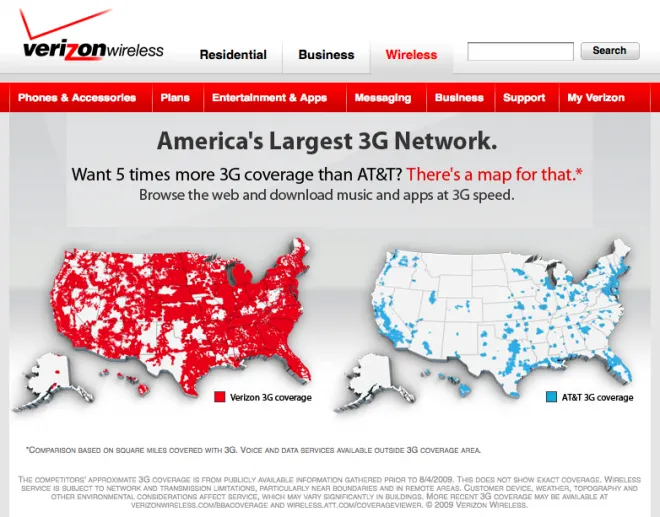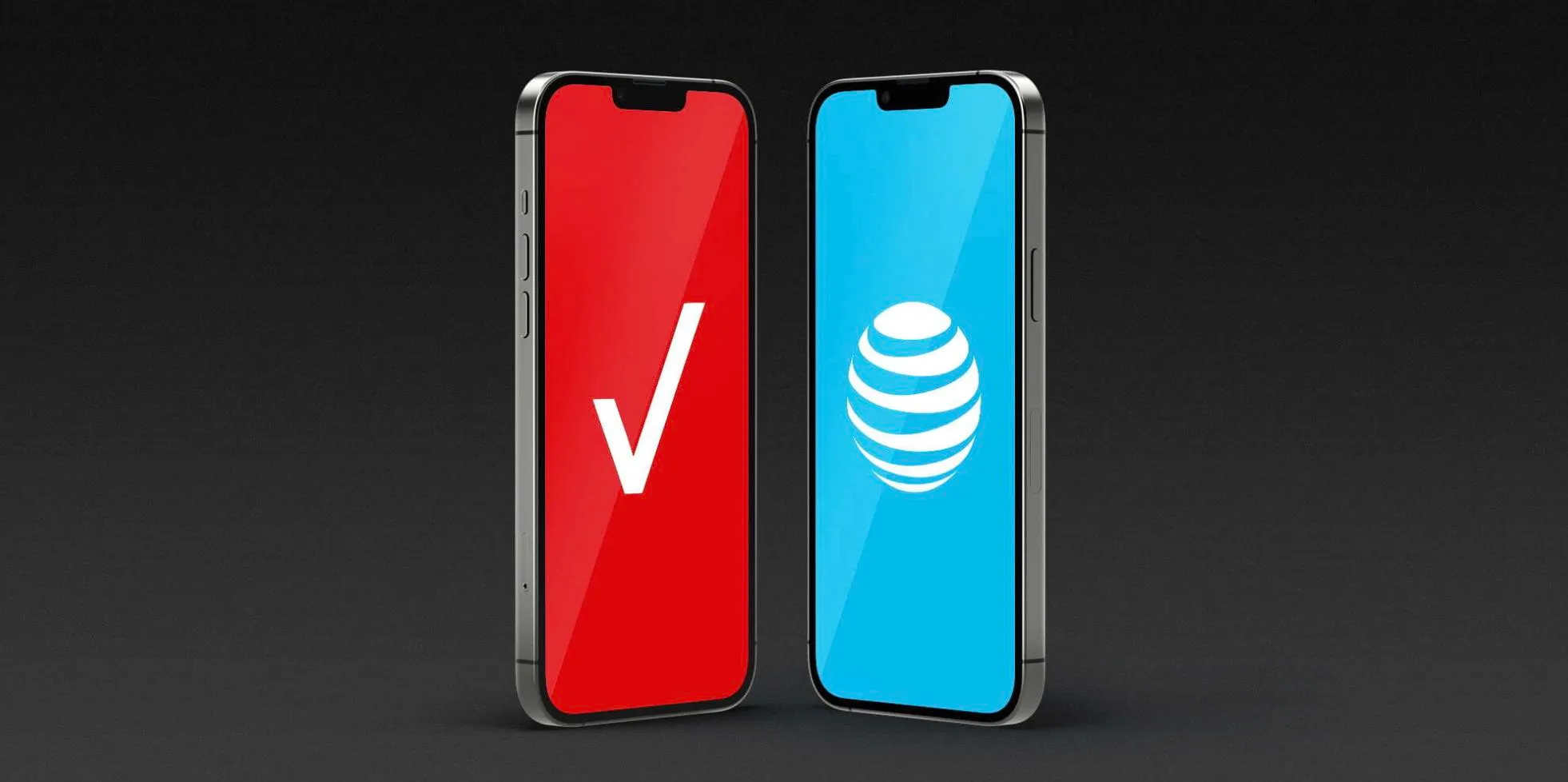In the ever-evolving world of mobile connectivity, two giants stand tall: Verizon Wireless and AT&T. Both offer a vast array of plans, features, and coverage, leaving many users wondering – Verizon Wireless vs. AT&T, which reigns supreme? The answer, like most things in life, isn’t a simple one. It depends heavily on your specific needs and priorities as a mobile user. This comprehensive guide dissects the strengths and weaknesses of both carriers, empowering you to make an informed decision and crown your champion in the wireless service battle.

Round 1: Network Coverage and Speed
Network Coverage:
- Verizon Wireless: Renowned for its robust nationwide coverage, Verizon boasts a strong signal in most areas, including rural regions. This makes it a reliable choice for travelers who frequently venture beyond densely populated urban centers.
- AT&T: While AT&T offers solid coverage in major cities and suburbs, its reach can be spotty in rural areas. This can lead to dropped calls and sluggish data speeds for users who travel extensively outside urban environments.
Data Speeds:
- Verizon Wireless: Verizon consistently ranks high in third-party network speed tests. Their 4G LTE network is reliable and offers fast download speeds in most areas. Additionally, Verizon has been diligently rolling out 5G technology, with pockets of blazing-fast speeds emerging in select locations.
- AT&T: AT&T boasts a wider 5G network compared to Verizon. However, their current 5G technology primarily utilizes millimeter wave (mmWave) frequencies, which offer superior speed but have a limited range. This means you’ll only experience those super-fast 5G speeds in specific areas with direct line-of-sight to a mmWave tower.
Verdict:
For users who prioritize widespread, reliable coverage and consistent data speeds, Verizon Wireless emerges victorious. However, if you reside in a major city with mmWave coverage and prioritize the absolute fastest speeds available in those areas, then AT&T might be the better choice.
Round 2: Plans and Pricing
Plan Options:
- Verizon Wireless: Verizon offers a range of plans, catering to individual needs and budget constraints. They have unlimited data plans with varying levels of prioritization and data allowances for hotspot usage. Additionally, Verizon offers tiered data plans for users who prefer a more traditional approach.
- AT&T: AT&T’s plans are quite similar to Verizon’s, with both unlimited and tiered data options. However, AT&T often bundles their plans with additional perks like free subscriptions to streaming services, which can be appealing to certain users.
Pricing:
- Verizon Wireless: Verizon is generally considered the more expensive carrier, particularly for their unlimited data plans. However, they sometimes offer promotions that can bring their prices closer to AT&T’s.
- AT&T: AT&T tends to be slightly cheaper than Verizon, especially for their unlimited data plans with lower data prioritization. This makes them a potentially more budget-friendly option for some users.
Verdict:
The winner in this round depends on your priorities. If you prioritize unlimited data with the highest speeds and network prioritization, then Verizon Wireless might be worth the extra cost. However, if you’re more budget-conscious and don’t mind potentially slower speeds, then AT&T’s bundled perks and lower pricing might be more appealing.
Round 3: Additional Considerations
Customer Service:
- Verizon Wireless: Customer reviews for Verizon’s customer service can be mixed. While some users report positive experiences, others express frustration with long wait times and complex procedures.
- AT&T: Similarly, AT&T’s customer service receives a range of reviews. Some users find them helpful, while others encounter challenges navigating their support systems.
Verdict:
Neither carrier receives consistently high marks for customer service. In this round, it’s a draw.
Device Selection:
- Verizon Wireless: Verizon carries a wide range of popular smartphones and tablets from various manufacturers. They often offer attractive deals and promotions on new devices when bundled with a plan.
- AT&T: AT&T also boasts a diverse selection of devices and frequently runs promotions on new releases.
Verdict:
Both carriers offer a strong selection of devices. This round is another draw.
The Final Verdict: It’s All About Your Priorities (Continued)
Here’s a quick recap to help you decide which champion best suits your mobile lifestyle:
Choose Verizon Wireless if:
- You prioritize widespread and reliable network coverage.
- You need consistent data speedsand network prioritization, especially for data-intensive tasks.
- You’re willing to pay a slight premium for unlimited data with the highest speeds and prioritization.
Choose AT&T if:
- You primarily reside in a major city with access to their mmWave 5G networkand prioritize the absolute fastest speeds available in those areas.
- You’re on a budget and find their bundled perks with streaming services
- You prioritize a slightly lower price pointfor unlimited data plans, even if it means potentially slower speeds at times.
Additional Tips:
- Consider your usage:Analyze your typical data usage, phone call frequency, and texting habits when choosing a plan.
- Check coverage maps:Both carriers offer online coverage maps. Utilize these tools to assess signal strength in your specific area.
- Read user reviews:Online reviews can provide valuable insights into real-life experiences with each carrier’s network, customer service, and plans.
- Consider promotions:Both Verizon Wireless and AT&T frequently run promotions and offer deals on plans and devices. Factor these temporary offers into your decision-making process.
Remember, there’s no single “best” carrier. The ideal choice depends on your unique needs and priorities. By carefully evaluating the factors discussed in this guide, you can confidently choose the champion that best suits your mobile lifestyle!

Beyond the Champions: Exploring Additional Options
While Verizon Wireless and AT&T are the dominant players, the wireless arena isn’t a two-horse race. Consider these additional options, depending on your specific needs:
- T-Mobile:T-Mobile offers competitive pricing and a rapidly expanding 5G network. They might be a good choice for budget-conscious users who prioritize good coverage and decent speeds.
- Mobile Virtual Network Operators (MVNOs):MVNOs like Cricket Wireless or Mint Mobile piggyback on the networks of major carriers like Verizon or AT&T, often offering more affordable plans with slightly less coverage.
The Final Word: Choosing Your Wireless Champion
The battle between Verizon Wireless and AT&T is an ongoing one, with each carrier boasting strengths and weaknesses. By understanding your priorities and leveraging the information presented here, you can confidently crown your champion in the wireless service arena. Remember, the ideal carrier is the one that seamlessly integrates with your mobile lifestyle, keeping you connected and empowered in today’s ever-connected world.